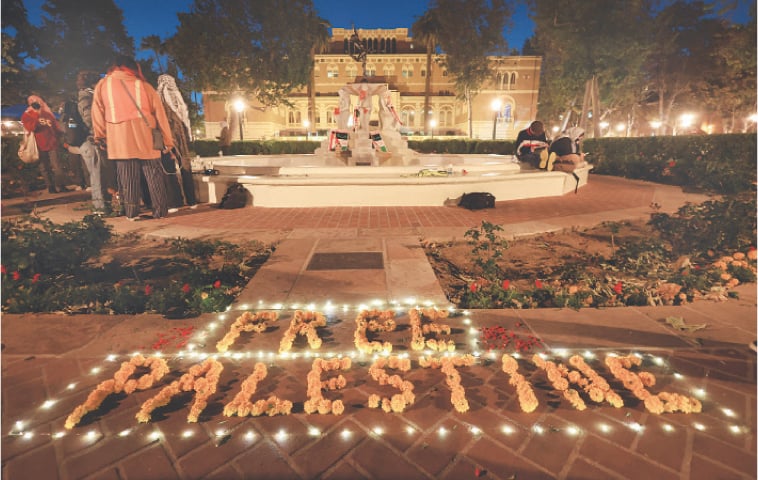At 7am on Thursday, shortly after arriving on campus, a fifth-year PhD student from Princeton University’s economics department was arrested and taken into custody in a holding cell.
His offense? Being present at a protest camp established by students demanding that the university divest from organizations and companies involved in or profiting from Israel’s actions in Gaza.
The student, a U.S. citizen of Pakistani descent, shared with Dawn that he was detained by university police, placed in a holding cell, and charged with trespassing.
“It felt very surreal,” he commented about the charge, considering his status as a university student with the right to be on campus at that time.
Out of around 100 individuals at the protest, only two of us were arrested, both of South Asian origin.
According to the student, protesters are urging the university to divest from entities like G4S (a UK-based security company) and the Department of Defense.
Most U.S. colleges and universities maintain endowment funds to support educational, research, student aid, and other services. These funds typically consist of donated money to the university.
As per the American Council on Education, a nonprofit association for higher education based in the U.S., these funds are usually invested for long-term financial gains.
Princeton’s endowment fund was $34.1 billion for the fiscal year ending June 30, 2023.
The student indicated that there was “very little financial transparency” regarding the university’s investments from its endowment.
He mentioned that the protesters representing various backgrounds — White, Jewish, Arab, African American, Asian, Hispanic, and Muslim.
The protest’s main objective was straightforward: to compel the university to “reveal, divest, and sever ties with organizations enabling the assault on Palestinian lives.”
Nationwide Demonstrations
In recent weeks, similar protests have taken place at universities across the U.S., sparking debates on free speech and political discourse on campuses.
In some universities, authorities summoned police and security forces to remove protesting students. AFP reported that over the weekend, approximately 275 individuals were arrested on four campuses, sometimes by police in riot gear employing chemical irritants and tasers.
The series of protests kicked off with students establishing a camp at Columbia University in New York last week.
A female student of South Asian descent enrolled in a master’s program informed Dawn that the ongoing encampment, which started on Wednesday, was initiated by the Columbia University Apartheid Divest coalition.
On Thursday afternoon, the university’s president, Nemat Minouche Shafik, called the New York Police Department to disperse the protesters.
In the ensuing action, 108 students were arrested, according to the student who spoke to Dawn anonymously.
She mentioned that this was the first time police had been called on students since 1968, amid anti-war protests during the Vietnam War.
This incident spurred the protests to spread to other U.S. universities. Students flocked to Columbia to demonstrate the very next day.
A similar police action occurred at the University of Michigan’s Ann Arbor campus.
One of the students recounted to Dawn that the use of excessive and unjustifiable force against protesters was shocking.
She claimed that one female protester was “body-slammed,” while another had her hijab forcibly removed.
Intimidation Tactics
Students speaking with Dawn believed that university administrations were threatening protesters with punitive measures for peaceful assembly.
The Princeton student believed that peaceful campus protests “should not be met with legal consequences.”
The universities “are falling short in upholding ideals of the right to express one’s opinions” and have “arbitrarily and forcefully” banned students from campus while threatening them with academic repercussions.
The University of Michigan student asserted that the administration was implementing “restrictive policies to suppress students.”
The university recently introduced a ‘Disruptive Activity Policy’ that “infringed upon their rights under the First Amendment,” which guarantees freedoms of religion, expression, assembly, and the right to petition.
The Columbia student claimed that the administration “refused to engage in sincere negotiations” and continued to use “fear-mongering tactics to intimidate students.”
Pro-Palestine protests often face counter-demonstrations, which students felt were not addressed with the same intensity.
University of Michigan students alleged that their camps were targeted by counter-protesters who “harass and intimidate” them. She added that protesting students have established “comprehensive safety protocols” to prevent any altercations and ensure the movement’s progress.




